
Excertos do catálogo

Implants trauma Olecranon Locking Plates System
Abrir o catálogo na página 1
CAUTION: Federal Law (USA) restricts this device to sale by or on the order of a board certified physician. WARNING: If there is no sufficient bone healing, wrong or incomplete postoperative care, plate might break. All ITS plates are preformed anatomically as a matter of principle. If adjustment of the plate to the shape of the bone is required, this is possible by carefully bending gently in one direction once. Particular care is required when bending in the region of a plate hole, as deformation of the plate may lead to a failure of the locking mechanism. The plate must not be buckled or...
Abrir o catálogo na página 2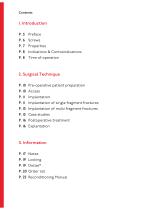
1. Introduction P. 5 Preface P. 6 Screws P. 7 Properties P. 8 Indications & Contraindications P. 8 Time of operation 2. Surgical Technique P. 10 Pre-operative patient preparation P. 10 Access P. 11 Implantation P. 11 Implantation of single fragment fractures P. 13 Implantation of multi fragment fractures P. 15 Case studies P. 16 Postoperative treatment P. 16 Explantation 3. Information P. 17 Notes P. 19 Locking P. 19 Dotize® P. 20 Order list P. 22 Reconditioning Manual
Abrir o catálogo na página 3
Preface The primary advantage of the locking olecranon plates lie in early functional postoperative treatment. Conventional fracture treatment with tension bands and subsequent immobilization can lead to heterotopic ossifications and subsequent limited mobility in the elbow.
Abrir o catálogo na página 5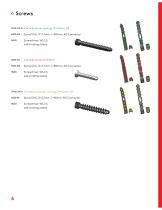
Cortical Screw, locking, D=3.5mm, SH Spiral Drill, D=2.7mm, L=100mm, AO Connector Screwdriver, WS 2.5, self-holding sleeve Spiral Drill, D=2.7mm, L=100mm, AO Connector Screwdriver, WS 2.5, self-holding sleeve Cancellous Screw, locking, D=4.2mm, SH Spiral Drill, D=2.5mm, L=110mm, AO Connector Screwdriver, WS 2.5, self-holding sleeve
Abrir o catálogo na página 6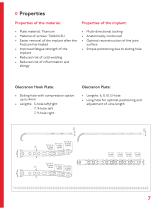
Properties Properties of the implant: • Plate material: Titanium • Material of screws: TiAl6V4 ELI • Easier removal of the implant after the fracture has healed • Improved fatigue strength of the implant • Reduced risk of cold welding • Reduced risk of inflammation and allergy • Multi-directional locking • Anatomically contoured • Optimal reconstruction of the joint surface • Simple positioning due to sliding hole Olecranon Hook Plate: Olecranon Plate: • Sliding hole with compression option up to 4mm • Lengths: 5-hole left/right 7, 9-hole left 7, 9-hole right • Lengths: 6, 8, 10, 12-hole •...
Abrir o catálogo na página 7
Indications, Contraindications & Time of operation Indications: • All dislocated fractures of the olecranon General problems with blood clotting Critical general condition Diabetes Damage of soft tissue Obesity Pre-existing arthrosis of the elbow Lack of patient compliance Time of operation: • Primary on the first day after the trauma • Secondary after swelling subsides, temporary fixation in an upper arm plastercast or with an external fixing device
Abrir o catálogo na página 8
Surgical Technique
Abrir o catálogo na página 9
Pre-operative patient preparation • Under a general anaesthesia or plexus anaesthesia with pneumatic partial deprivation of blood supply • Supine position or abdominal position Access A slightly bow-shaped skin incision should be made in the radial direction, deviating from the ulnar edge, in order to create a soft tissue flap which will cover the plate. The scar should not extend directly above the plate. However, in individual cases, preexisting scars or deep abrasions can cause access to be changed.
Abrir o catálogo na página 10
Implantation The bone is skillfully prepared with the scalpel. The fracture segments should be exposed as carefully as possible in order to not further decrease blood flow. The elbow joint should be radially exposed as far as necessary to enable a good view of the joint surface of the olecranon, and of the final reduction. Implantation of single fragment fractures Single fragment fractures can be reduced directly with the olecranon hook plate. It is implanted like a reduction hook and is initially screwed to the ulna in the sliding hole. When compression principle of the sliding hole is...
Abrir o catálogo na página 11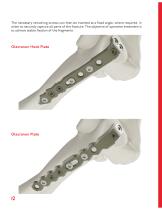
The necessary remaining screws can then be inserted at a fixed angle, where required, in order to securely capture all parts of the fracture. The objective of operative treatment is to achieve stable fixation of the fragments. Olecranon Hook Plate Olecranon Plate
Abrir o catálogo na página 12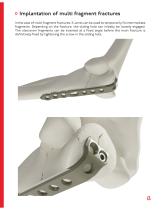
Implantation of multi fragment fractures In the case of multi fragment fractures, K-wires can be used to temporarily fix intermediate fragments. Depending on the fracture, the sliding hole can initially be loosely engaged. The olecranon fragments can be inserted at a fixed angle before the main fracture is definitively fixed by tightening the screw in the sliding hole.
Abrir o catálogo na página 13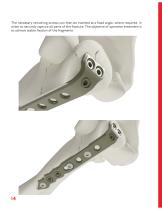
The necessary remaining screws can then be inserted at a fixed angle, where required, in order to securely capture all parts of the fracture. The objective of operative treatment is to achieve stable fixation of the fragments.
Abrir o catálogo na página 14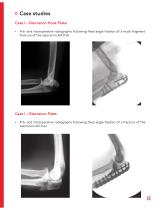
Case studies Case 1 - Olecranon Hook Plate: • Pre- and intraoperative radiographs following fixed angle fixation of a multi fragment fracture of the olecranon AO 21 B1. Case 1 - Olecranon Plate: • Pre- and intraoperative radiographs following fixed angle fixation of a fracture of the olecranon AO 21 A1.
Abrir o catálogo na página 15
Postoperative treatment • Dependent on swelling and the condition of the soft tissue, application of an upper arm cast until wound is completely healed • Physical therapy • Free early functional therapy following removal of the sutures Explantation If desired by the patient, the implant can be removed. Removal should be performed at the earliest 1 1/2 years later or after radiographic verification of the healed bone. The problem of cold welding was resolved by using a special surface treatment (for further information see page 19).
Abrir o catálogo na página 16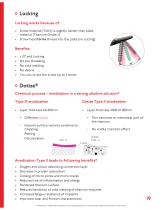
Locking Locking works because of: • Screw material (TiAlV) is slightly harder than plate material (Titanium Grade 2) • Screw head forms thread into the plate (no cutting) ± 15° and Locking No pre threading No cold welding No debris You can re-set the screw up to 3 times Dotize® Chemical process - anodization in a strong alkaline solution* Type III anodization Dotize Type II anodization + Film becomes an interstitial part of the titanium - Implant surface remains sensitive to: Chipping Peeling Discoloration Type - III - No visible cosmetic effect Dotize® Type - II Ti-Oxid Anodization Type II...
Abrir o catálogo na página 19Todos os catálogos e folhetos técnicos I.T.S.
-
ufs
1 Páginas
-
DHL
2 Páginas
-
ITS
2 Páginas
-
DHL - Distal Humeral Locking Plates
20 Páginas
-
PHL
24 Páginas
-
ACLS
20 Páginas
-
CFN
32 Páginas
-
OLS
24 Páginas
-
PHLs
20 Páginas
-
CTN - Cannulated Tibia Nail
28 Páginas
-
UOL - Ulna Osteotomy Locking Plate
32 Páginas
-
SR Sacral Rods
20 Páginas
-
HCS
24 Páginas
-
TOS Twist-Off Screw
20 Páginas
-
TLS
20 Páginas
-
PRS-RX
32 Páginas
-
HLS
20 Páginas
-
PLS - Pilon Locking Plates System
24 Páginas
-
ES
20 Páginas
-
SR
20 Páginas
-
FL
24 Páginas
-
PL - Pilon Locking Plate small
12 Páginas
-
PRS - Pelvic Reconstruction System
28 Páginas
-
PRL - PROlock Radius Locking Plate
20 Páginas
-
OHL - Olecranon Hook Locking Plate
24 Páginas
-
PHL - Proximal Humeral Locking Plate
28 Páginas
-
CAS
40 Páginas
-
FCN
20 Páginas
-
HOL
24 Páginas
-
FLS
24 Páginas
-
PFL
20 Páginas
-
DTL
24 Páginas
-
HTO
24 Páginas
-
PTL
32 Páginas
-
DFL
32 Páginas
-
SCL
32 Páginas
-
SLS
24 Páginas
-
CAL
20 Páginas
-
DUL
24 Páginas
-
CLS
28 Páginas









































































